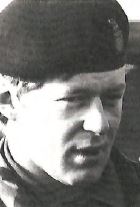Jeremy Mains died on the 8th of January 2020 and few if any grieving families had to overcome the many complex difficulties which prevented the holding of a Thanksgiving Service until the end of October 2021.

It finally took place in a splendid tent at Wincanton Racecourse big enough to hold both the congregation of several hundred and the wake which followed the service.
Jeremy joined the Irish Hussars in 1973 at Barker Barracks in Paderborn, West Germany and was posted to ‘B’ Squadron where, as a Troop Leader, he immediately made his mark, gaining the respect and friendship of all ranks for his professionalism, his sense of fun and his care for those under his command.
As a boy, he had learned to ride and play pony club polo and he soon became a key member of the Regimental team which, in common with those of other cavalry regiments, spent its summers at various tournaments held in places as far apart as Munich and Berlin. He was a talented all-round games player representing the Army at both squash and racquets as well as polo.
Jeremy’s sense of adventure led him to contemplate applying for the SAS but the leadership of his fellow cornets into barely legal practical jokes resulted on one occasion in an injury which led to him being downgraded physically and in due course to ending prematurely a military career.
In 1978 he was appointed Assistant Adjutant and then Adjutant on the premise that good order and military discipline among the young officers can best be maintained by someone who has tested the system comprehensively.
At Tidworth in 1979, the departure of the Commanding Officer for an unscheduled four-month stint in Zimbabwe with the Commonwealth Monitoring Force which over-saw that country’s first universal suffrage election, and the fact that the Second-in-Command lived miles away, effectively resulted in day-to-day command of the Regiment falling to Jeremy. This unexpected responsibility was exercised faultlessly.
After accompanying the Regiment to Munster where he served in ‘D’ Squadron, he finished his service where it began, at Sandhurst thereby depriving the Irish Hussars of a fine officer and the Army of one clearly destined for high rank.
In the business career which followed he predictably succeeded spectacularly and as a pillar of the Portman Hunt he was an ever-present enthusiast always quick to help and advise the young.


